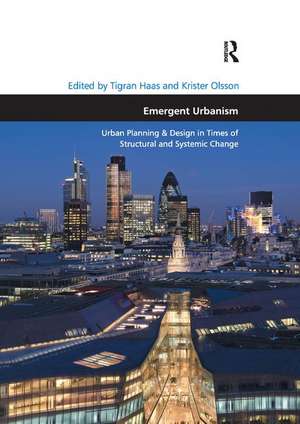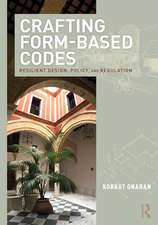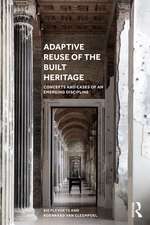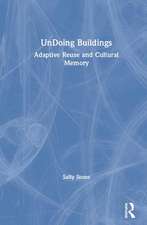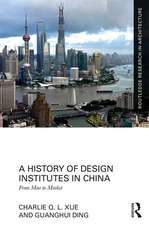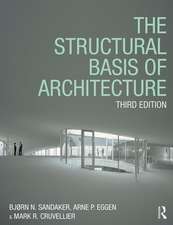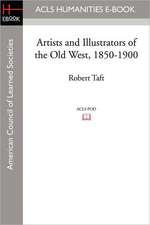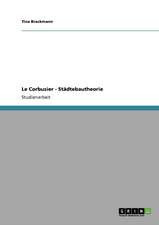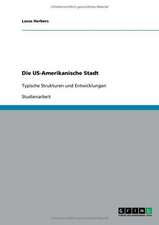Emergent Urbanism: Urban Planning & Design in Times of Structural and Systemic Change
Autor Tigran Haas, Krister Olssonen Limba Engleză Paperback – 5 feb 2018
Preț: 325.34 lei
Preț vechi: 371.71 lei
-12% Nou
Puncte Express: 488
Preț estimativ în valută:
62.27€ • 67.67$ • 52.34£
62.27€ • 67.67$ • 52.34£
Carte tipărită la comandă
Livrare economică 21 aprilie-05 mai
Preluare comenzi: 021 569.72.76
Specificații
ISBN-13: 9781138547384
ISBN-10: 1138547387
Pagini: 204
Dimensiuni: 174 x 246 x 31 mm
Greutate: 0.45 kg
Ediția:1
Editura: Taylor & Francis
Colecția Routledge
Locul publicării:Oxford, United Kingdom
ISBN-10: 1138547387
Pagini: 204
Dimensiuni: 174 x 246 x 31 mm
Greutate: 0.45 kg
Ediția:1
Editura: Taylor & Francis
Colecția Routledge
Locul publicării:Oxford, United Kingdom
Cuprins
Contents: Introduction: emergent urbanism and beyond, Krister Olsson and Tigran Haas. Part I The New Urban Context: Alphaville and Masdar: the future of urban space and form?, Alexander R. Cuthbert; Imagining biophilic cities, Timothy Beatley; A long view at high speed, Andrew Ballantyne; Creativity, diversity and interaction: urban space and place-making, Ali Madanipour; Incremental urbanism: the emergence of informal settlements, Kim Dovey; The city seen: strategies of coherence, evocation and simulation in urban representation, William Uricchio. Part II Processes of Planning and Urban Change: Social capital in the age of megacities and the knowledge economy, Hans Westlund; Cities of culture and culture in cities: the emerging uses of culture in city branding, Gregory Ashworth and Mihalis Kavaratzis; The field of urban composition, Mark C. Childs; The subject of place: staying with the trouble, Jonathan Metzger; What is good urbanism?, Nan Ellin; The challenge of social sustainability: revisiting the unfinished job of defining and measuring social sustainability in an urban context, Andrea Colantonio. Part III The Urban Product: Emergent urbanism as the transformative force in saving the planet, Peter Newman; Does the city have speech?, Saskia Sassen; Planning the emergent and dealing with uncertainty: regulations and urban form, Emily Talen; The responsive city: the city of the future re-imagined from the bottom up, Sarah Williams; The environmental paradox of the city, landscape urbanism and new urbanism, Douglas Kelbaugh. Index.
Notă biografică
Tigran Haas is an Associate Professor at KTH - The Royal Institute of Technology, Stockholm, Sweden and Krister Olsson is an Associate Professor at the University of Gothenburg, Sweden.
Recenzii
’Can a city be part of a sustainable ecosystem? This book deals with the complex processes of city design and the field of emergent urbanism. In times of profound urban and social change, which are transforming our systems of infrastructure and public space, this book offers a critical overview of recent trends for scholars, students and practitioners.’ Steffen Lehmann, Curtin University, Australia ’Are urban design and planning today contributing adaptive solutions to cities or exacerbating the systemic problems for them caused by climate change, digital technologies, the post-industrial economy, resource scarcity, and the widening gap between rich and poor? This is the brilliant question posed by the editors of this wide-ranging and provocative exploration of emerging urbanism. Don’t expect consensus from the A-list of authors - but do expect your thinking about the professional roles of urbanists to be challenged and prepared for change!’ Ellen Dunham-Jones, Georgia Institute of Technology, USA ’The 21st century demands a different kind of architect, open to new ways of thinking about design and the role of the profession in the social, economic and political arenas. Emergent Urbanism is a timely publication that skilfully illuminates these broader forces of structural change, and reminds us that cities must ultimately respond to the aspirations and needs of the people that call them home.’ Alfredo Brillembourg, Urban-Think Tank/ETH Zürich, Switzerland
[T]here are a number of interesting chapters, and the issues pursued are of great interest. Urban planning and design is relatively weak in theoretical framing and in situating practice within a wider context. This book can help strengthen the debate in this space. - Robin Hickman, Journal of Transport Geography
[T]here are a number of interesting chapters, and the issues pursued are of great interest. Urban planning and design is relatively weak in theoretical framing and in situating practice within a wider context. This book can help strengthen the debate in this space. - Robin Hickman, Journal of Transport Geography
Descriere
Bringing together leading academics from across a range of disciplines, Emergent Urbanism identifies the specific issues dominating today’s urban planning and urban design discourse, arguing that urban planning and design not only results from deliberate planning and design measures, but how these combine with infrastructure planning, and derive from economic, social and spatial processes of structural change. Combining explorations from urban planning, urban theory, human geography, sociology, urban design and architecture, the volume provides a comprehensive and state-of-the-art overview, highlighting the complexities of these interactions in space and place, process and design.
